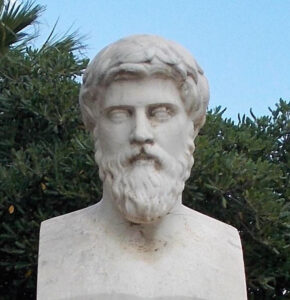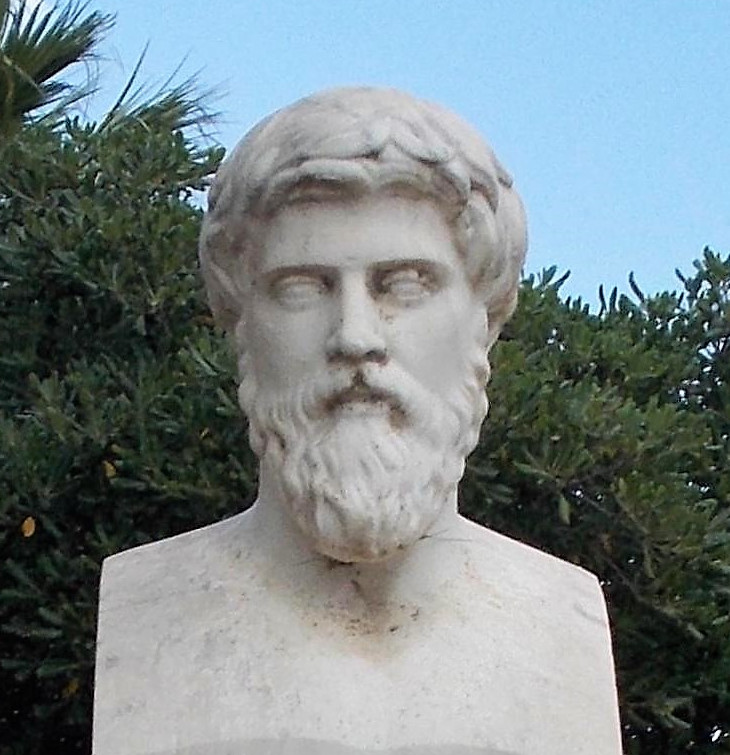Born in the reign of the Roman Emperor Claudius, Plutarch (46-120 CE) took great pride in being a priest at the Temple of Apollo in Delphi (he was born just 30 miles from there). But for us, his main claim to fame is as a writer of biographies: much of what we know of famous people from ancient Greece and Rome derives from his Parallel Lives. Luckily another work of his to survive, known as the Moralia, is a collection of 78 essays and transcribed speeches.
While many books have been written about Plutarch, this one is unique in looking at the polis, which translates as the city. Rome was the biggest city in the world when he was living, but he mentions many others in many different contexts.
The purpose of this book on Plutarch is left in no doubt by the editors in their introduction. “Our aim is to foster discussion of the city both as a physical entity and as a social organization with emphasis on Plutarch’s representations of the intellectual, religious, cultural, and artistic landscape as a lived experience in the present and the past, and of the significance of the polis as a paradigm to think with.”
The beginning of this book can be traced back to a symposium in Delphi in 2013. Seventeen scholars have joined forced to write chapters for this important volume. It is edited by Lucia Athanassaki (Prof. of Classical Philology, Univ. of Crete) and Frances Titchener (Prof. of History and Classics, Utah State Univ.).
Since Classical Athens and Sparta loom so large in ancient Greece (ancient even in Plutarch’s time, five centuries in his past), many readers will be keen to explore Plutarch’s analysis of their tempestuous relationship. In that, one will be disappointed. Christopher Pelling (Emeritus Regius Professor of Greek, Univ. of Oxford) writes “Plutarch has little explicit contrasting of the characters of Athens and Sparta.”
Plutarch expresses reservations about Spartan militarism but “it comes out as primarily a judgement on Rome, not on Sparta at all.” Pelling then quotes Plutarch: “But did not Rome progress to the better through warfare? That is a question requiring a long answer for people who define ‘the better’ in terms of wealth and luxury and domination rather than safety and gentleness and self-sufficiency accompanied by justice.”
As a resident in Rome for several years, Plutarch spoke from personal experience here. In a chapter on that subject by Paolo Desideri (Univ. of Firenze), “the city of Rome itself became for him a sort of living archive with which he could explore and interrogate.” Plutarch was able to consult archives and speak to its inhabitants for their own historical memory; Desideri’s chapter concentrates of these eyewitness accounts. The author even speculates that Plutarch used his stays in Rome “as opportunities for documentary research campaigns.” In his description of Rome, Plutarch wrote of things no one else ever did (in our extant record), such as a statue to Cato the Elder, and he even gives the inscription upon it. He also tells that Fabius Maximus moved a “colossal statue of Hercules from Tarentum and set it up in the Capitol near an equestrian statue of himself, in bronze.” Such a bold and eccentric move gives us a clue, writes Desideri, of the psychology of the politically ambitious Fabius, a Roman statesman who was named dictator in 221 and 217 BCE.
As for Athens, Athanassaki offers us a fascinating look at how Plutarch engaged with the monuments in that city. “Plutarch tells how Athens’ cultural legacy saved the city from total destruction.” This was in 405 BCE. In an assembly of the allies that defeated the great city, a Theban moved that it be “razed to the ground” but, as Plutarch relates, “all were moved to compassion, and felt it to be a cruel deed to abolish and destroy a city which was so famous, and produced such poets.” In his own text on Athens, De gloria, Plutarch was (says Athanassaki) “an interested, observant, and sophisticated sight-seer.” By ignoring post-classical additions to the Athenian Agora, he just related the glory days of Athens through a description of its “monumental architecture, sculpture, iconograph and topography.” By so doing, “he took an active part in shaping the landscape of the city’s cultural memory.”
The relationship between Alcibiades and Athens is so complex it requires two chapters to cover it all. The authors are the appropriately-named Athena Kavoulaki (Univ. of Crete) and Timothy Duff (Univ. of Reading). The first author tells of a great procession from Athena to Eleusis which had fallen into abeyance. Alcibiades restored it in 407 BCE and she describes in vivid detail what the 22 km-long procession was like. She contrasts this with Alcibiades’ excessive conduct at the Olympic Games in 416 BCE where “he seems to attempt to reverse the relationship between the individual and the city.” By examining the varied opinions about Alcibiades amongst the Athenian populace, Duff gives us “a portrait not only of the great individual but also of the city which produced him.”
Alexei Zadorojnyi (Univ. of Liverpool) explores this further in his chapter. “Plutarch is equally fond of inscribing cities with psychological and moral qualities and, through language that borders on personification, making these cities into ethical agents.” Plutarch extends a discussion of the gates of the city to the gates of the psyche. This leads Zadorojnyi to a significant realization. “The gates with which the city of the soul is furnished by Plutarch are not merely an embellishing detail, but a spin-off from the model of the soul wherein perception is the indispensable checkpoint and flashpoint of psychological and moral response.” This city/soul analogy, which I found to be one of the most insightful take-aways in the book, “helps to triangulate the three major ideological circuits” that Plutarch employs. “His sustained interest in the human soul and character, his scrutiny of city-state politics, and his choice to explore both character and the polis with, and through, Plato.”
At the other end of the spectrum from this analysis, Plutarch wrote fondly of his own home, Chaeronia, and of nearby Delphi. “Plutarch clearly identified himself as Chaeronian,” writes Ewen Bowie (Univ. of Oxford), “despite spending much of his time in Athens and Delphi…Plutarch the philosopher did not set himself the task of writing a local history, but the Sympotic Questions [in the Moralia] is subtle and effective tribute to his native place.”
In one memoir Plutarch tells of a tour of the sanctuary of Delphi, but he suppresses any mention “of the monuments of the Persian Wars, when the Greeks fought side by side to defend their freedom and defeat a great empire.” I find this very strange, and author Philip Stadter (formerly at Univ. of North Carolina) does not really tell us why this was so.
He does, however, bring before our eyes a very evocative scene. “Plutarch and his friends sit on the steps of the temple of Apollo, looking towards the shrine of Earth [Delphi was believed to be the centre of the planet]. The monuments Plutarch mentions recalled moments of glory, but also the terrible tragedy of Greeks warring against Greeks. Those fraternal conflicts ended with Rome’s expansion into Greece in the second century BCE.” The ‘presence of history’ that is so vivid in Delphi is revisited in Parallel Lives, where Plutarch especially notes three monuments there connected to Rome. Plutarch writes of the visit to Delphi by the Emperor Nero – it was a double-edged sword. While Nero granted Delphi freedom and a large sum of money, he also took 500 bronze statues and sent them to Rome. Faced with both the Greek and Roman engagement with Delphi had a great effect on Plutarch. “Living in constant contact with this historical record,” Stadter writes, “seems to have led him to a fundamental rethinking of the nature of heroism and the role of a civic leader.”
As this overview of a few chapters shows, the authors have succeeded in delivering the first thorough discussion of the city in the works of Plutarch. This will serve as an essential reference work for all Plutarch studies moving forward.
There are 3 minor typos: On page 6 we find “in in”; on Pg. 148 “at ways in ways”; and on Pg. 273 “statues” should be “statutes.”
Plutarch’s Cities lists for $115. It is by Oxford University Press.
Image: A modern bust of Plutarch, based on an ancient one from Delphi which likely depicts him. This file is licensed under the Creative Commons Attribution-Share Alike 4.0 International license.
Addendum: For those who want to explore further recent studies in Plutarch, I suggest getting a copy of this 2023 book by Brill: Plutarch’s Unexpected Silences.
For more on Alcibiades, read my recent review of this Oxford Univ. Press book in SunNewsAustin.com:

